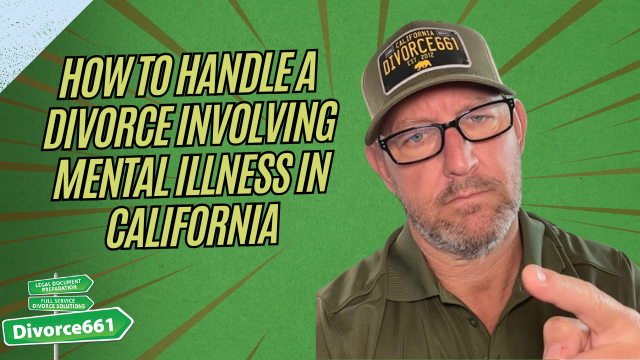How to Handle a Divorce Involving Mental Illness in California
Divorce is never easy. When one spouse is living with a mental illness, the process can feel even more complicated and emotionally taxing. If you are facing this situation, you may be asking: can I still move forward? How will mental health affect custody, support, and the overall timeline? Here is a clear, compassionate guide to what to expect and how to protect your rights in California.
Legal Basics: Mental Illness Is Not a Barrier to Divorce
In California, a mental health diagnosis is not a legal reason to deny a divorce. You do not need your spouse’s permission to file, and the court will not refuse to grant a divorce solely because one spouse has a mental illness. The legal grounds for divorce focus on irreconcilable differences or other statutory reasons, not on a spouse’s mental health status.
How Mental Illness Can Affect Key Issues
Although mental illness does not prevent a divorce, it can influence important decisions in your case. The most common areas where mental health may matter are:
- Child custody and visitation. Courts decide custody based on the best interests of the child. A parent’s mental health may be one factor the court considers when evaluating stability, safety, and the ability to meet a child’s needs.
- Spousal support. A spouse’s mental health can affect earning capacity, employment status, and need for support. These factors may influence the amount and duration of spousal support ordered.
- The ability to participate in the process. If a spouse is unable to meaningfully participate in negotiations or court proceedings because of their condition, the case may need to be adjusted to ensure fairness. This could include appointing counsel, using conservatorship proceedings in separate circumstances, or adjusting timelines.
Practical Steps to Protect Your Interests
When mental illness is part of a divorce, taking thoughtful, practical steps helps keep the process focused and respectful. Consider the following actions:
- Document concerns and communications. Keep records of relevant incidents, communications, and any professional evaluations when appropriate.
- Prioritize children’s safety and stability. If there are immediate safety concerns, seek appropriate emergency or protective measures and consult an attorney right away.
- Consider neutral dispute resolution where possible. Mediation or structured negotiation can reduce conflict and be tailored to accommodate a spouse who struggles with participation.
- Be mindful of confidentiality and sensitivity. Mental health information is personal. Use it only when necessary to resolve legal issues and avoid public airing of private health matters.
- Work with experienced counsel. A lawyer familiar with sensitive situations can help you follow proper procedures, preserve your rights, and keep the case moving forward.
Real Example: How a Thoughtful Approach Helped Finalize a Divorce
“We recently helped a client whose spouse had been diagnosed with a severe mental health condition. We guided them through the process with care, made sure all legal steps were followed, and helped structure an agreement that protected both parties while still getting the divorce finalized.”
That case illustrates a practical path forward. We focused on clear documentation, respectful communication, and legal safeguards so the agreement was fair and executable without unnecessary delay.
When to Involve Other Professionals
Mental health issues can sometimes require involvement from professionals beyond your attorney. Depending on the circumstances, you may need:
- Therapists or psychologists to provide evaluations relevant to custody or capacity
- Medical records or testimony to document a condition when it affects parenting or earning ability
- A guardian ad litem or attorney appointed to represent a party who cannot advocate for themselves
These steps should be taken carefully and with legal guidance to protect privacy and avoid unnecessary escalation.
How to Keep the Process Respectful and Legally Sound
The goal is to resolve the divorce in a way that protects legal rights while respecting the dignity of everyone involved. That means following correct legal procedures, being realistic about the effects of mental illness on parenting and finances, and seeking solutions that prioritize safety and stability.
Getting Help
If your divorce involves mental health concerns, you do not have to navigate it alone. An experienced team can help keep the paperwork in order, protect your rights, and structure agreements that work for both parties. Services that provide clear pricing, remote handling of filings, and compassionate guidance can simplify an already difficult process.
For help moving forward with clarity and compassion, consider scheduling a consultation to discuss your situation and next steps. A knowledgeable legal team can explain options specific to California law and help you pursue a resolution that fits your needs.
Remember: mental illness does not block your right to divorce, but it does call for careful planning and sensitivity. With the right approach, you can protect your interests and reach a fair, respectful outcome.

